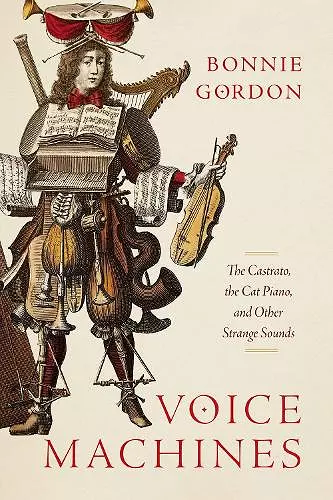Voice Machines
The Castrato, the Cat Piano, and Other Strange Sounds
Format:Hardback
Publisher:The University of Chicago Press
Published:31st May '23
Should be back in stock very soon

An exploration of the castrato as a critical provocation to explore the relationships between sound, music, voice instrument, and machine.
Italian courts and churches began employing castrato singers in the late sixteenth century. By the eighteenth century, the singers occupied a celebrity status on the operatic stage. Constructed through surgical alteration and further modified by rigorous training, castrati inhabited human bodies that had been “mechanized” to produce sounds in ways that unmechanized bodies could not. The voices of these technologically enhanced singers, with their unique timbre, range, and strength, contributed to a dramatic expansion of musical vocabulary and prompted new ways of imagining sound, the body, and personhood.
Connecting sometimes bizarre snippets of history, this multi-disciplinary book moves backward and forward in time, deliberately troubling the meaning of concepts like “technology” and “human.” Voice Machines attends to the ways that early modern encounters and inventions—including settler colonialism, emergent racialized worldviews, the printing press, gunpowder, and the telescope—participated in making castrati. In Bonnie Gordon’s revealing study, castrati serve as a critical provocation to ask questions about the voice, the limits of the body, and the stories historians tell.
“Every so often a book appears after decades of historical spadework and deep thinking. Voice Machines is that book. Gordon’s vivid imagination and her analytical skill at suturing the smallest details to the largest conceptual understandings gleam on every page. With bracing lucidity, she builds her histories brick by brick from long-lost archives while also intuiting powerful meanings from present-day politics and artefacts. That double motion enables her canny reflections on voice, body, technology, race, the machinic, the postcolonial, and the posthuman to lead to a reimagining of castrato history. The upshot is something of a miracle. Voice Machines gives us a radically new argument, delivered with estimable intellectual power, wit, and verve, about the stakes of musical bodies as machinic assemblages.” * Martha Feldman, author of 'The Castrato: Reflections on Natures and Kinds' *
“Voice Machines is a terrific book. Gordon doesn’t hold back, using the figure of the castrato to rethink the history of sound reproduction, organology tout court, the naive claims of sound studies and posthumanism, histories of the South, conceits of sex, and what it means to be human. The history of the machine, like the history of the human, is complex. And it is this complexity, as much as the complexity of the sound world of early modern Europe, that jostles for our attention on every page. An epistemological pickle, the castrato was also a figure who, perfected through surgery, enhanced sensory knowledge and extended physical nature by, for example, transubstantiating matters like air or breath into others, like voice. The sound of that voice becomes newly visceral and material in these pages.” * J. Q. Davies, author of 'Creatures of the Air: Music, Atlantic Spirits, Breath, 1817–1913' *
"The question of the morality of alterations to the body concerning sex and gender is once again at the forefront of right-wing political organizing. Gordon is undistracted by the transphobic explosion in contemporary politics, confining herself to the merest gestures toward the Supreme Court and other implications for the present day—she always centers the music. And yet, her argument is undeniably topical: Voice Machines insists that individual people with bodies relate and respond to the creative cultures around them, as well as to each other, ungovernably. Resisting a closure that would be false, she lets the reader hear the harmony and name it for themselves." -- Jo Livingstone * 4Columns *
"Gordon explores the castrato as a cultural phenomenon and a critical mode of inquiry into the technological relationships that have existed between humans, machines, sounds, and instruments, from early modern to contemporary times. . . [A] gorgeously sweeping, multidisciplinary book that is equal parts historical and visionary." -- Sarah Lawson * C-VILLE Weekly *
"In Gordon’s vivid prose, the castrato becomes a figure that maneuvers European music history and its colonial and racial violences. . . For a text that deals with inaudible bodies, there is a lot of sound." * Sound Studies *
"Gordon offers a unique perspective on castrati, the vocal acrobats who enhanced the sensory delight of baroque opera audiences. . . Particularly focusing on the relationship of music and technology, Gordon moves back and forth through history. . . .Based on decades of research, Voice Machines poses fascinating questions about the voice, music, technology, and humanity." * Choice *
"This is a virtuoso treatment of a journey through a very particular nexus of the natural and the man-made, a narrative woven together to give as deep and as wide a stage for Gordon’s conclusions as possible." * ARSC Journal *
ISBN: 9780226825144
Dimensions: 229mm x 152mm x 33mm
Weight: 708g
432 pages